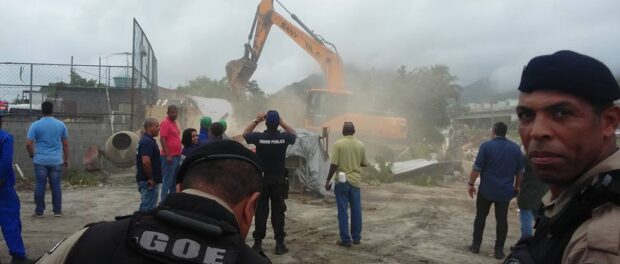
Vila Autódromo, the favela fighting eviction on the edge of the Rio 2016 Olympic Park, has been under intense pressure for months. City officials have made threats that residents “will leave in pain,” and in January Municipal Guards built a new wall dividing the community, isolating some houses in the Olympic building site. Despite the residents’ award-winning plan to upgrade the community and repeated guarantees that they can stay from Mayor Eduardo Paes, the City is intensifying its efforts to evict the remaining residents. Last week, the City obtained an order for the removal of title over the Residents’ Association building, but that order was suspended after the intervention of Rio’s public defenders.
Today, February 11, the pressure increased again with the shock demolition of three houses behind the Residents’ Association building. No prior warning was given to residents, who were terrified to wake up at 6am and find that numerous busloads of shock troops, firefighters and City officials, including Barra de Tijuca sub-Mayor Alex Costa, had entered the community with demolition equipment. They destroyed three homes behind the Residents’ Association building and football pitch, ignoring complaints from residents. As community activist Maria da Penha put it: “what can we do against armed troops?”

The City’s actions today are at direct odds with the Mayor’s statements, made on January 19, that only one family in Vila Autódromo still had to be removed. His statements, in response to a direct question about the future of Vila Autódromo, made no suggestion that the homes by the Residents’ Association or the Association building itself had to be removed.
These three houses included the home of Altair Antunes Guimarães, the president of the community’s Residents’ Association who was away when the demolitions took place. Without Altair there, residents found it impossible to stop the demolitions, as they were unclear on the legality of the City’s actions, specifically whether the three houses were included in the order forbidding demolition of the Residents’ Association. With the Municipal Guard now in the community 24 hours a day, many residents suspect the City chose to do these demolitions today as they knew Altair would not be there to defend the buildings. Since he is their official spokesperson, the residents were unsure if they were legally allowed to intervene.
The houses were on land owned by the Residents’ Association, leaving many residents convinced the Association building itself, with its huge symbolic importance, remains in the city’s crosshairs. The residents have not been told why these building are being removed. Maria da Penha believes that the houses and Association building are being removed because Olympic organizers want to create a “beautiful place,” without these “homes on the ground” and the “ugly association building” that lie in the view of what will be the media’s hotel for the Olympics.
The land occupied by the Residents’ Association includes two parcels of land. The first parcel, which includes the Residents’ Association building and the three homes destroyed, had been previously marked as “protected” under an official decree by the City. The second parcel directly behind, used as the Residents’ Association garden, does not have the same “protected” status. Residents suggested that the City may have believed the houses were built on the unprotected parcel, which is the justification the City seems to have used in this round of demolitions. Residents also said that since one resident had begun construction on the land before accepting compensation to leave the community, the City used this pretext to destroy all three homes on the land, although none of them belonged to this resident.
This is just one example of residents’ uncertainty over the legality of the City’s actions, which underscores the City’s failure to provide due information in advance, not only today but throughout their negotiations with residents. Residents were also told that only the owner of the houses, Altair, could negotiate with the bailiff, and as he was not there, the demolitions proceeded. When he arrived later, Altair said the land on which his home stood was protected by the decree from the city, making the demolition illegal. He called the judge who signed the demolition order a bandit, arguing that “justice doesn’t exist for the poor.” In his house he had “a television, a fridge and air conditioning,” but now has “only the clothes on his body” and “no documents.”
This is not the first time Altair has been removed from his home. Aged 14, he was removed from his home on Caiçaras Island in the wealthy South Zone Lagoa neighborhood, and moved to City of God. He was moved again during the late 1990s to make way for the construction of the Yellow Line highway, linking the North Zone to Barra de Tijuca. He has since become a central figure in Vila Autódromo as president of the Residents’ Association and has long protested against plans to remove the community, dating back to previous attempts to remove residents before the Olympic Games were announced. He was evicted from his home in Vila Autódromo in August 2015 and moved into the home behind the Residents’ Association building which was destroyed today, marking the fourth time in his life he has been evicted from his home by Rio municipal authorities. With that house now gone, he now intends to stay in the Residents’ Association.
One of Altair’s comments today summed up a sentiment heard from so many residents across Rio’s favelas and peripheral neighborhoods: “People think Brazil is marvelous, but marvelous for whom? Not for the poor.”



